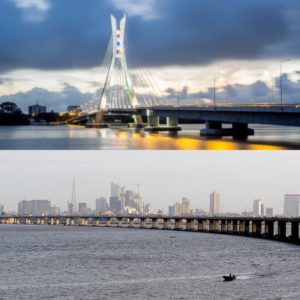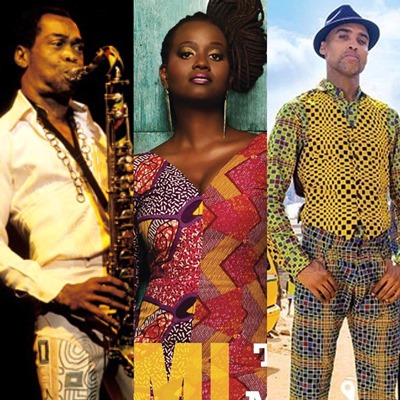There are bound to be different angles of portrayal when various people are asked to describe the city of Lagos. In a situation which hinges on personal truths, every narrative is a culmination of each person’s experiences within the city.
Common unifying threads tying these various angles together can be easily identified, but the varying shades of disparities in individual stories is what gives the city its fitting multicolored panorama.

Over a week ago, I had a conversation with a friend who recently travelled back to Australia following a 7-month work stay in Lagos. While we often struck up jumbled conversations about her adjustment to Lasgidi during her stay, this particular conversation took a clearer and more concise outlook. With the tonal difference being attributed to the time she’d taken to piece together and crystallize the effects Lagos had had on her. Each minor and major event coalescing into her conclusive takes.
Repeatedly listening to Fela’s ‘Monday Morning In Lagos’ before traveling in didn’t mean that my friend was ready for the gridlock in transit, both to and from work.
And watching Nollywood flicks didn’t mean she would find it easy to navigate through real life conversations with Lagosians. The fun and the stress were eons more than she expected.
Nothing fully prepares visitors for the throbbing energy of Lagos. Ideas can be formed from other people’s narratives with pictures on the internet to create an imagery, but they barely ever translate the visceral feeling of experiencing those events.
Her experiences – good and bad, trivial and consequential have given her a rolodex of memories, all of which eventually informed her currently formed opinions of Lagos and its inhabitants. Experiences and opinions she has shared with me and will inevitably share with other people interested in listening to stories about her trip.
Chopping it up with my friend opened up a similar faucet of feelings I felt upon my first listen to Somi’s 2014 album, The Lagos Music Salon. Recommended to me by a friend in 2015, Salon is a representation of many of the feelings experienced on sublime wax.
Born to and raised by parents of Ugandan and Rwandan descent in Champaign, Illinois, Somi is a singer/songwriter with heavy leanings towards jazz music. Her incorporation of African languages and progressions of origins from African music is aptly described by the self coined term, New African Jazz music. Considered her most definitive body of work, The Lagos Music Salon was borne out of her experiences during her extended stay in Lagos which lasted for over a year.
Taking inspiration from events, encounters and observations, Somi relates her experiences and also explores matters of varying complexities, especially those related to womanhood. On Salon, Somi’s easy-to-fixate writing and warm, wide-ranging vocals are emboldened by a functional sonic bridge which gorgeously binds jazz and music genres native to Nigerians like Juju, Highlife, Afrobeat, and Afro-pop.
In documentary-esque fashion, the album begins with Somi’s encounter with custom agents upon her arrival at the airport on ‘First Kiss: Eko I Ni Baje’. Skits like the intro, featuring conversations with different people are sprinkled on the album, giving it the inclusive feel of regular Lagos folks – from the comedic relief of ‘The Story Of Monkey’ to the camaraderie of communal gossip on ‘Hearts & Swag’. An uncredited female narrator cum adviser is featured on ‘Four.One.Nine’, a song about rejecting the fleeting promises of fraudulent lovers who are quite prominent in Lagos.
In singing about love on Salon, Somi employs pristine songwriting, with intermittent use of words from pidgin and Yoruba – both important languages for communication in Lagos. ‘Akobi: First Born S(u)n’ blends twinkling keys, guitar licks and rolling Yoruba local percussions to form a light, sexy jam, on which Somi asks to be the only one for an unnamed lover. The verses are delivered in English, with the immaculate hook cleanly sung in Yoruba.
‘Love Juju #1’ is a blue-eyed song about being charmed with a love potion, with a similarly hypnotic groove heavily influenced by juju music. ‘Love Juju #2’ is a jazzy rework of ‘#1’, retaining the ethos and lingo. A standout moment is a flowery rework of Nelly Uchendu’s ‘Love Nwantiti’, featuring gospel music group, In His Image. ‘Love Nwantiti’ is filled with gorgeous harmonies, a mellifluous song that personifies the proverbial stomach butterflies when in love.
The late great Fela, who made Lagos his home during his lifetime gets a rework of his 1972 mansplaining classic, ‘Lady’. The ever delightful Angelique Kidjo is featured on ‘Lady Revisited’, on a song rearranged to contain lyrics with feminist proclamations. The cross-rhythmic Afrobeat groove of the original remains at the core, albeit with a little more compacted, intricate setting. It is moments such as this where Somi focuses on topical issues related to women that Salon hits high points of emotional crescendo.
The softly stirring and highly captivating ‘Two Dollar Day’ is a heartbreaking depiction of the plight of a single mother struggling to make ends meet in an unforgiving economic terrain. Although her voice is airy over the ethereal jazzy afro-soul palette, Somi’s description of the woman’s difficulty in commuting back home from work due to little pay, high fuel prices and bus fares is quite heavy.
Another gripping point is the dirge-like mood that emanates from ‘Brown Round Things’. Singing over a morose combination of solemn piano keys and Ambrose Akinmusire’s piercing horns, Somi pays homage to the resilience of a sex worker, taking into consideration struggles involved in her profession.
Salon closes out with ‘Shine Your Eye’, which condenses all the emotions felt and subsequently expressed on the album into a spellbinding, intriguing spoken word outro. A melted haze of the good, the bad and the ugly, ensuring that every inch of The Lagos Music Salon is seen as homage and a genuine portrayal of Lagos (and inherently, Nigeria and Africa) through Somi’s eyes.
If my friend writes a memoir on her Lagos stay, which will inevitably spiral out of her experiences and observations, it isn’t inane to think it would be in tonal sync with Somi’s The Lagos Music Salon. Granted, there will be some scenario changes, but with both women coming from more progressive countries and backgrounds, the similarities will be easier to spot.
As interesting and intriguing as the visitor’s perception is, my friend’s point of view on various Lagos-related issues and The Lagos Music Salon both read like ‘How I Spent My’ essays to me. Which doesn’t in the least bit lessen the relevance of their experiences and how they portray them. While their opinions stem from their memories of a relatively short term stay, someone like me who’s spent the majority of his life in Lagos will have a different approach in describing Lagos.
Bantu’s Agberos International is the album that I would say mostly describes Lagos from the citizen’s angle. While The Lagos Music Salon is a collage of well taken and beautifully filtered pictures, Agberos International is a portrait that is deep-dyed in the realism and traditional ideals of Lagos.
Led by Ade Bantu, a veteran singer and former judge on MTN Project Fame West Africa, Bantu is an electric 13-man musical ensemble. They’re a truly remarkable band that has only garnered positive reviews by those who have seen them live on stage, after finding their home on the monthly open air ‘Afropolitan Vibes’ concerts.
While I have not seen Bantu live on stage (soon to be crossed off the checklist), the few performance videos I was privileged to watch pushed me to listen to Agberos International, shortly after its release a few months ago.
Agberos International embodies the spirit of Nigeria, with its roots firmly planted in the music and socio-cultural values of Lagos. The album is a 50 minute musical ride that is rebellious, topical, joyous and highly rhythmic, all at once. The album displays musical diversity rooted in native music from genres like Afrobeat Yoruba Folk, Highlife and the group’s self styled Afropunk.
While he wisely cedes vocal control to other members of the group on some of the songs, Ade Bantu takes charge a lot of the time from the front. It takes a bit to adjust to his raspy singing and oft off-kilter rapping flow, it barely dulls the incision of his lyrics, especially during his spoken word verses on politically inclined songs. ‘Stori Plenti’ boils with anger at politicians who spew empty promises while campaigning, only to renege on them on getting into office. An all too familiar narrative for anyone living in Nigeria.
The derision of corrupt politicians is dressed in mockery on the intro of ‘Niger Delta Blues’, with the lyrics sung in Yoruba, call-and-response style. The song morphs into a slow rolling Afrobeat tune – squiggly foundational guitar riff and a complementary electric bass guitar, with Afrobeat co-progenitor, Tony Allen in his mercurial element on drums. In a clear-eyed lacerating rant, Ade bemoans the dilapidated state of the Niger Delta, despite its economic importance as Nigeria’s major Oil producing area. Lagos is largely regarded as Nigeria’s commercial capital city, but it’s impossible to underestimate the importance of the Niger Delta. “The blues of the Niger Delta has become the blues of Nigeria, yours and mine”, Ade deadpans.
In spite of the harsh economic and social conditions, Nigerians always find a way to remain hopeful and grateful. ‘Ka Maa Dupe’ is a loose groove, tribal soul cut that implores the need to grateful and hopeful regardless of less than ideal situations. There’s also positivity on ‘Se Jeje’, which encourages patience in a city that bursts with the BPM of an EDM song.
Another integral part of Lagos that shows its camaraderie is its love for occasions with party-like atmospheres. Owambe as they are typically called are usually filled with dancing and beautiful women draped in beautiful outfits. Laced with dance inducing drums, snappy highlife guitar riffs and splicing horns, ‘Lagos Barbie’ combines dance and beautiful women. It celebrates African beauty in an unbridled manner, with the cheeky hook requesting the women to “wave your wigs in the air”.
In a country where the dream of many Nigerian youths is to leave the country in search of greener pastures elsewhere, it is impossible to not feel a deep, spiritual sense of pride and belonging as ‘Ile (Africa)’ closes out Agberos International. We resent our government for being incompetent, but still find ways to fight our uphill battles and celebrate every milestone. That is how I will portray the story of Lagos (and inherently, Nigeria).
Everyone’s experiences and how they interpret them are peculiar. From lifelong Lagosians to visitors, the perspectives shift but each narrative still ultimately captures the spirit of Lagos. Millions of individual experiences, one city. Two albums, a handful of differences, one Lagos.


